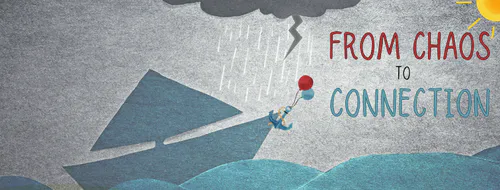FROM CHAOS to CONNECTION
- 22 Jun 2026 (9:00 am) to 24 Jun 2026 (4:00 pm)
- The Glen Hotel, 24 Gaskell St, Eight Mile Plains, Queensland, 4113, Australia
| Trainer | Tamar Sloan (AUS) |
|---|---|
| CPD Hrs | 21 |
| Includes | Catering, handbook and certificate |
| Book Stall | At the workshop |
A Relational Approach to Complex Behaviours in Families, Schools and Communities using NVR
You've worked with that case (maybe many). Where parents are exhausted, teachers are burned out, and the young person is spiralling. The one where rewards don't work. Where consequences make things worse.
Traditional behaviour management often fails with complex presentations; aggression toward caregivers, anxious avoidance, school refusal, device addiction. The harder adults push, the more the child resists. Everyone escalates together.
A Different Framework
Relational Presence (also known as Non-Violent Resistance or NVR) offers a fundamentally different approach. Developed from the principles of Gandhi and Martin Luther King and refined through clinical research, this framework shifts the focus from controlling the child to anchoring the adult.
The research is robust. NVR has demonstrated effectiveness across a range of presentations including violence, suicidal threats, ADHD, eating disorders, OCD, school refusal, and failure to launch. Outcomes consistently show reduced challenging behaviours, decreased escalation, improved parental self-control, and better parent-child relationships.
The format is highly interactive, you'll work through realistic case studies drawn from families, schools, and residential settings. You'll leave with practical strategies you can use immediately, not just theoretical knowledge. Topics include:
- Exploring the theoretical foundations and evidence-base of the NVR/Relational Presence framework.
- Discovering how to recognise and interrupt escalation cycles.
- Learning the fundamental principles of the model, including presence and connection, and how these form the foundation for effective intervention.
- Exploring central concepts such as parental presence, loving persistence, and active resistance.
- Learning empowering strategies like supportive communication, relational gestures, and supporters.
- Engaging in guided introspection and group discussion to explore your own experience of Relational Presence, deepening your understanding and making the principles truly resonate in your everyday life.
- Applying the NVR/Relational Presence framework to complex and personal case studies mirroring your professional experience, ensuring a practical and deeply relevant understanding of Relational Presence in real-world contexts.
- Discovering how NVR/Relational Presence can be applied in a wide variety of presentations, including neurodiversity, anxious avoidance, device addiction and at-risk behaviours.
Ideal for psychologists, social workers, allied health practitioners, residential support workers, teachers, and school counsellors, Relational Presence training equips professionals with the tools to partner effectively with parents and caregivers - creating a safer, more connected environment for children and adolescents.
Presenter: Tamar Sloan is a registered psychologist and one of Australia’s most highly qualified Relational Presence (Non-Violent Resistance) practitioners, bringing extensive experience in both education and community settings. She’s both a private practitioner and supports families in government services. By combining evidence-based principles with real-world application, she focuses on empowering families, educators, and fellow professionals to confidently address challenging behaviours. Tamar’s compassionate, interactive, and engaging style ensures participants gain practical skills that foster meaningful, lasting change for families in their care.
Audience: for mental health, education and other professionals that apply behavioural/developmental/neuro-science and systemic thinking to their practice.
Mental Health Professionals: All mental health professionals including, but not limited to Clinical Counsellors, Psychologists, Psychotherapists, Psychiatrists, Social Workers, Nurses, Occupational Therapists, Hospice and Palliative Care Workers, Youth Workers, Mental Health Workers, Addiction Specialists, Marital & Family Therapists, Child Protection and Disability Workers, Guidance Officers, Speech and Language Therapists, Residential Care Workers and Foster Support Workers, Youth Justice, and all other mental health professionals looking to enhance their therapeutic skills.
Education Professionals: Professionals who work with children or youth including, but not limited to K–12 Principles, Teachers, School Counsellors, School Paraprofessionals and all other professionals who support behavioural challenges and complex learning needs.
Tickets
Related products
Non-Violent Resistance in Trauma-Focused Practice
A Systemic Approach to Therapy and Social Care
$60.99 AUDincl GST


















